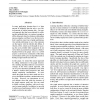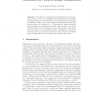876 search results - page 37 / 176 » Limits on the Usefulness of Random Oracles |
109
click to vote
ICML
2004
IEEE
16 years 1 months ago
2004
IEEE
In many application domains there is a large amount of unlabeled data but only a very limited amount of labeled training data. One general approach that has been explored for util...
84
Voted
ASIACRYPT
2003
Springer
15 years 6 months ago
2003
Springer
Provable security usually makes the assumption that a source of perfectly random and secret data is available. However, in practical applications, and especially when smart cards a...
125
Voted
GLOBECOM
2009
IEEE
15 years 7 months ago
2009
IEEE
—The emerging biometric cryptography has gained significant interests for key management and privacy protection, but the previously proposed schemes using set metrics for finge...
149
Voted
CORR
2006
Springer
15 years 25 days ago
2006
Springer
Given a sample from a probability measure with support on a submanifold in Euclidean space one can construct a neighborhood graph which can be seen as an approximation of the subm...
98
Voted
EUROCRYPT
2007
Springer
15 years 7 months ago
2007
Springer
Abstract. We present two universally composable and practical protocols by which a dealer can, verifiably and non-interactively, secret-share an integer among a set of players. Mo...


